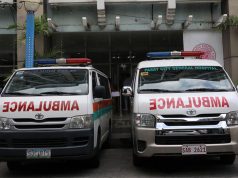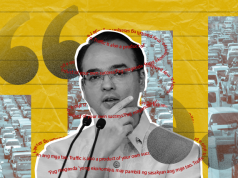A Facebook user shared a video clip of an ambulance carrying a patient in critical condition that was blocked by counterflowing vehicles causing heavy traffic.
When it made rounds online, people noted that such situation is unfortunately common in busy cities in the country.
Facebook user Jing Zamora posted this as a livestream on July 5. It soon gathered over 18,000 shares and 700,000 views after.
Only in the philippines😠😡Emergency na nga ayaw pa mag sipagtabi mga drivers mga walang awa!
Posted by Jing Zamora on Friday, July 5, 2019
Zamora did not indicate the location of the incident. She captioned it with: “Only in the Philippines! Emergency na nga ayaw pa mag sipagtabi mga drivers mga walang awa!”
As seen in the video, vehicles on the road were not giving way to the ambulance despite the emergency sirens.
Some of them even counter flowed to the ambulance’s side of the road. The ambulance driver could also be seen going out of the vehicle to gesture other motorists to clear the path .
“Nakakainis talaga. Alam na ngang emergency. Itong mga Pilipino, ewan ko ba,” part of Zamora’s complaints in the eight-minute clip.
While users mostly criticized the vehicles blocking the ambulance, some said there have been similar cases in major cities in the country.
Some patients reportedly died on the road due to congestion and poor implementation of traffic rules.
In 2015, a mother died on the road because the ambulance they were aboard couldn’t get pass the heavy traffic that time.
In 2018, an ambulance en route to the hospital got delayed by motorcycles for about 10 minutes, the video of which made rounds online.
In April 2019, an ambulance driver and a traffic enforcer’s bickering in the middle of the road resulted in the death of a patient in Cagayan de Oro City.
Right of way for ambulances
Making way for emergency vehicles such as an ambulance is stated in Republic Act 4136 or the Land Transportation and Traffic Code.
In section 34, it is stated that
“All authorized emergency vehicles, such as ambulance and police cars and fire wagons used for emergency calls shall be equipped with a bell, siren, or exhaust whistle of a type approved by the Commissioner, and no such device shall be installed or used in any other vehicle.”
Other vehicles shall then provide a path to these upon hearing their sirens or signals. This is specifically explained in section 49, wherein
“Upon the approach of any police or fire department vehicle, or of an ambulance giving audible signal, the driver of every other vehicle shall immediately drive the same to a position as near as possible and parallel to the right-hand edge or curb of the highway, clear of any intersection of highways, and shall stop and remain in such position, unless otherwise directed by a peace officer, until such vehicle shall have passed.”










